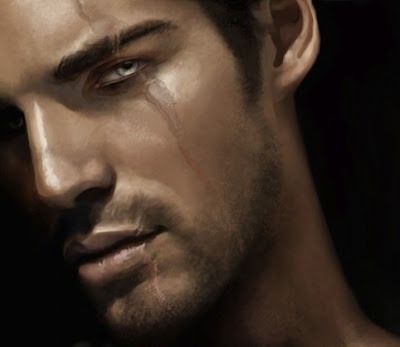Lookinglass
 ceci est la couleur des mes revesthis is the colour of my dreams
ceci est la couleur des mes revesthis is the colour of my dreamsYou all know how much I love description and how I seem to hang my hat on that point. Abigail recently wrote up a post on describing characters which I thought was really good and well worth reading. Abigail is, of course, very logical and more clear on points than I ever am. I'm a happy-go-lucky kind of writer. Anyway, I recommend reading the post, but the gist of it is, don't get locked into the cliche venues of describing characters. Keep in mind Point of View; make sure the character making observations is in character by and while doing so; and don't info-dump description: "the alabaster-skinned girl flung herself over the balcony, slim figure caught against the beryl-blue sky, her daffodil-golden hair floating around her narrow, freckled face, making a kind of halo for her until she put up one slender hand - a pianist's hand - to push back the heavy yellow locks from her exotic features..." She may have all of that, but for goodness' sake don't drown us with it all at once.
I think my strength tends to lie in exposition of emotion. I still war with Skander over his hair colour: it is brown, a rich, aristocratic brown, but he's a blond kind of guy. And typically I simply don't mention it. I tend to deal with his emotions, and the emotions of the other characters, to give the readers not only a view of the person's physical expression, but a clearer expression of the soul.
He did not say anything, but there was in his eyes for an instant a look almost of despair, like a weaponless man getting a glimpse of the dragon’s yawning mouth.
Later she understood what he had said, but her mind had wandered to Rhodri again. Blue, blue like lightning, blue like the sky breaking through the storm: odd, disjointed, broken images of him flickered across her vision.
Here are two instances of the same character being described in my typical emotional way, but from different angles. The first excerpt channels his image at you and the main character through his own emotion, fairly purely and unbiased. The second excerpt, though of the same character, filters his image to you through the emotion of the main character. It is a very slight different and I want to assure you that I did not write these two passages that way consciously (so don't overthink your writing), but the difference is there: in the first the image is very clear-cut, fixed, concentrated and vivid; in the second it is diluted by the oppression of sorrow and sheer blind weariness. The same character is being portrayed, but just as in life the person is seen differently through different circumstances.
It was a pale, sorrowful face that looked back at her; but somehow it was a different paleness than her former sickly one. She looked haunted. But beneath that pale hauntedness was a harder, firmer skin, and something that was shockingly masculine.
This is a case of negative appeal. Not all of us look our best all the time. Sometimes it seems like nine time out of ten we look kind of shabby. So the character doesn't look ill anymore, but her adventures haven't exactly left her with perfectly formed nails and cheeks of alabaster. What she has, has a kind of appeal: it's nice to be hardy and to survive; but under the surface of this piece is an exchange of things, something unwanted given up for something probably not wanted either, and that coats the passage with a sense of something lost. She doesn't want to look hardy, like a survivor. She's a woman. She wants to look beautiful. She didn't want to give up her pale, pinched looks for a set jaw and a hard cleft between her eyes. This isn't a case of someone turning grotesque: it's that sad case of life turning our appearance into something we don't want, something we can't avoid.
[Rupert] sighed and seemed suddenly very weary, worn out, a huge, sharp-angled shadow: his profile was the grim sketch of all great men. “I forget that you are English.”
Appeal in the bad guys. Not always that shining, swaggering, impossibly-gorgeous appeal (though that has its place, believe me). Here I've given you, not a description of his clenched brow and frown, etc., but a sense of heaviness and cast you back on the memories of the terrible great ones who have stamped themselves on our history. Sometimes description isn't a case of telling how something looks, but diverting you to imagine what something is like, and I tend to do that with an emotional link, which, I find, helps bridge the gap between the image, the reader, and the tertium quid to which I am alluding. "Fair to see and slender as a racehorse" - one of my favourite descriptive lines, though not one I can claim, does that for me.
Just for once, take a look into how you favour description. I filter mine through layers of emotion, but what do you do? Please don't suppose I think all description must be that intensively emotional. I don't always use emotion as a filter: sometimes I use objective description ("fair to see and slender as a racehorse") and play upon the emotions of the main character with those images. If you're not too shy, I would love to see posts on this chock full of your character-descriptive passages. I love blundering through other writers' work and seeing how you paint the world! Go on, have a go at it!
Published on September 01, 2012 10:20
No comments have been added yet.



